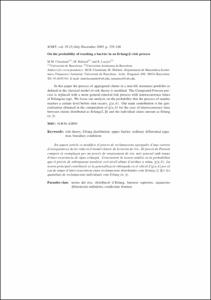Mostra el registre d'ítem simple
On the probability of reaching a barrier in an Erlang(2) risk process
| dc.contributor.author | Claramunt Bielsa, M. Mercè |
| dc.contributor.author | Mármol, M. Teresa |
| dc.contributor.author | Lacayo, Ramón A. |
| dc.date.accessioned | 2007-11-12T19:47:48Z |
| dc.date.available | 2007-11-12T19:47:48Z |
| dc.date.issued | 2005 |
| dc.identifier.citation | Claramunt Bielsa, M. Mercè; Mármol, M. Teresa; Lacayo, Ramón A.. "On the probability of reaching a barrier in an Erlang(2) risk process". SORT, 2005, Vol. 29, núm. 2 |
| dc.identifier.issn | 1696-2281 |
| dc.identifier.uri | http://hdl.handle.net/2099/3764 |
| dc.description.abstract | HolaIn this paper the process of aggregated claims in a non-life insurance portfolio as defined in the classical model of risk theory is modified. The Compound Poisson process is replaced with a more general renewal risk process with interoccurrence times of Erlangian type. We focus our analysis on the probability that the process of surplus reaches a certain level before ruin occurs, χ(u,b). Our main contribution is the generalization obtained in the computation of χ(u,b) for the case of interoccurrence time between claims distributed as Erlang(2, β) and the individual claim amount as Erlang (n, γ). |
| dc.format.extent | 235-248 |
| dc.language.iso | eng |
| dc.publisher | Institut d'Estadística de Catalunya |
| dc.relation.ispartof | SORT. 2005, Vol. 29, Núm. 2 [July-December] |
| dc.rights | Attribution-NonCommercial-NoDerivs 2.5 Spain |
| dc.rights.uri | http://creativecommons.org/licenses/by-nc-nd/2.5/es/ |
| dc.subject.other | Statistics |
| dc.subject.other | Mathematical economics |
| dc.title | On the probability of reaching a barrier in an Erlang(2) risk process |
| dc.type | Article |
| dc.subject.lemac | Aplicacions (Matemàtica) |
| dc.subject.lemac | Matemàtica financera |
| dc.description.peerreviewed | Peer Reviewed |
| dc.subject.ams | Classificació AMS::62 Statistics::62P Applications |
| dc.subject.ams | Classificació AMS::91 Game theory, economics, social and behavioral sciences::91B Mathematical economics |
| dc.rights.access | Open Access |
| local.personalitzacitacio | true |


